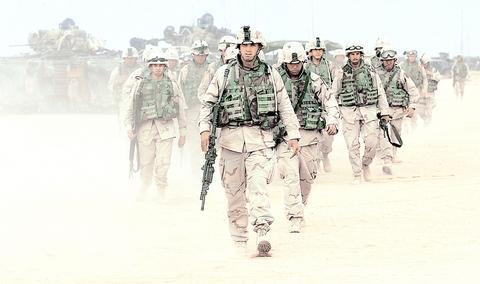Iraq's multinational peacekeeping force hurried to regroup Monday after Spain's announcement that it would pull out its 1,300 troops, with Albania pledging more soldiers and US officials bracing for further withdrawals.
Honduras followed suit late Monday night, with President Ricardo Maduro announcing the pullout of his troops ``in the shortest time possible,'' confirming US fears.

PHOTO: EPA
Spanish troops will leave Iraq in less than six weeks, Defense Minister Jose Bono said Monday in Madrid, but it remains unclear who will take their place. The 9,500 peacekeepers under Polish command are charged with the south-central sector, where followers of radical Shiite cleric Muqtada al-Sadr are waging a bloody campaign against the occupation.
Polish officials said they thought greater UN involvement might help wavering countries make new troop commitments, or at least follow through with what they have already promised.
``A UN resolution would be a great help,'' Polish Defense Minister Jerzy Szmajdzinski said.
Szmajdzinski said Spain's decision caught him by surprise. ``We are all working intensively on several variants on how to make up for the leaving troops,'' he told a Polish newspaper. ``Perhaps we will have to reorganize the division.''
Brigadier General Mark Kimmitt, the top US military spokesman in Iraq, sought to allay fears about the implications of the Spanish pullout, saying there would be no ``security vacuum in that area at any time.''
``Numerically those are numbers [the Spanish contingent] that should be able to be replaced in fairly short order,'' Kimmitt said.
US President George W. Bush scolded Prime Minister Jose Luis Rodriguez Zapatero for the abrupt withdrawal, telling him in a telephone conversation Monday to avoid actions that give ``false comfort to terrorists or enemies of freedom in Iraq.''
``The president urged that the Spanish withdrawal take place in a coordinated manner that does not put at risk other coalition forces in Iraq,'' White House press secretary Scott McClellan said.
Poland has the most troops, 2,400, in the 23-nation force, and Szmajdzinski said it could not send any more.
But Albania immediately said it was ready to increase its presence. At the moment Albania's commitment is mostly symbolic, consisting of 71 non-combat troops patrolling the city of Mosul under U.S. command.
Honduras' 370 troops have been serving in Najaf under Spanish command, a situation that was thrown into doubt when Spain announced its pullout plan.
The Honduran president's withdrawal announcement came hours after Honduran military spokesman Colonel Rafael Moreno said his country's forces would remain in Iraq under Polish command.
But Maduro said in a national television address that ``I have told the coalition countries that the troops are going to return from Iraq.'' The president said the soldiers would return home ``in the shortest possible time and under safe conditions for our troops.''
El Salvador's 380 troops in Iraq will remain and serve under Polish command, the Salvadoran military said Monday.
Zapatero announced the pullout just hours after his Socialist government was sworn in, fulfilling a campaign promise. Spain is the third-largest contributor of troops to the multinational force and the sixth-largest overall in Iraq.
Zapatero had initially pledged to remove the troops if the UN did not take political and military control of the situation in Iraq by June 30. In making his announcement to remove them as soon as possible, Zapatero said there were no signs the situation would have changed enough to satisfy Spain by that deadline.

A fire caused by a burst gas pipe yesterday spread to several homes and sent a fireball soaring into the sky outside Malaysia’s largest city, injuring more than 100 people. The towering inferno near a gas station in Putra Heights outside Kuala Lumpur was visible for kilometers and lasted for several hours. It happened during a public holiday as Muslims, who are the majority in Malaysia, celebrate the second day of Eid al-Fitr. National oil company Petronas said the fire started at one of its gas pipelines at 8:10am and the affected pipeline was later isolated. Disaster management officials said shutting the

US Vice President J.D. Vance on Friday accused Denmark of not having done enough to protect Greenland, when he visited the strategically placed and resource-rich Danish territory coveted by US President Donald Trump. Vance made his comment during a trip to the Pituffik Space Base in northwestern Greenland, a visit viewed by Copenhagen and Nuuk as a provocation. “Our message to Denmark is very simple: You have not done a good job by the people of Greenland,” Vance told a news conference. “You have under-invested in the people of Greenland, and you have under-invested in the security architecture of this

Japan unveiled a plan on Thursday to evacuate around 120,000 residents and tourists from its southern islets near Taiwan within six days in the event of an “emergency”. The plan was put together as “the security situation surrounding our nation grows severe” and with an “emergency” in mind, the government’s crisis management office said. Exactly what that emergency might be was left unspecified in the plan but it envisages the evacuation of around 120,000 people in five Japanese islets close to Taiwan. China claims Taiwan as part of its territory and has stepped up military pressure in recent years, including

UNREST: The authorities in Turkey arrested 13 Turkish journalists in five days, deported a BBC correspondent and on Thursday arrested a reporter from Sweden Waving flags and chanting slogans, many hundreds of thousands of anti-government demonstrators on Saturday rallied in Istanbul, Turkey, in defence of democracy after the arrest of Istanbul Mayor Ekrem Imamoglu which sparked Turkey’s worst street unrest in more than a decade. Under a cloudless blue sky, vast crowds gathered in Maltepe on the Asian side of Turkey’s biggest city on the eve of the Eid al-Fitr celebration which started yesterday, marking the end of Ramadan. Ozgur Ozel, chairman of the main opposition Republican People’s Party (CHP), which organized the rally, said there were 2.2 million people in the crowd, but